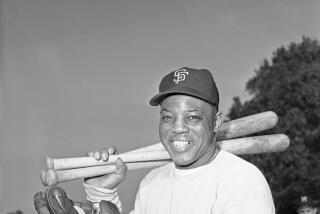Willie Wilson’s Life Has Changed, but He is Still Paying for Same Mistake
- Share via
KANSAS CITY, Mo. — Willie Wilson is one of the fastest players in baseball, but he found out last summer that even he couldn’t outrun sound. So this summer the centerfielder of the Kansas City Royals isn’t even going to try.
The sound that Wilson tried to escape last summer was the prattle from the grandstands--the references to drugs, the comments about cocaine, the catcalls of “junkie.”
That verbal abuse ws inevitable: Wilson was a baseball player but he was also a convict. He had served 81 days in a federal corrections institution in Fort Worth the previous winter for attempting to possess cocaine.
That prison sentence gave Wilson a late start at spring training and even when he did report following his release in early March, he was allowed back to baseball only on a limited basis. He would work out with his teammates in Florida but he couldn’t play any exhibition games.
Wilson also couldn’t play any real games for a while; then-baseball commissioner Bowie Kuhn had suspended him and former Kansas City teammates Willie Aikens and Jerry Martin for the opening six weeks of the 1984 season for their drug involvement. When Wilson finally returned to uniform May 16, he found a hostile public awaiting him.
“I was excited to play the game again but I wasn’t excited about getting the abuse I knew I was going to get,” Wilson said. “I’d be lying if I said it didn’t bother me but I kept trying to ignore them (fans). I might have gotten mad in my mind but I didn’t say anything to offend anybody. The best way to shut them up ws to get a hit, to make a catch. I’m not going to let that kind of guy bother me. By the ninth inning, if you don’t yell back, the guy is going to be tired and hoarse and wonder if it was all worth it.
“But I was completely drained by the end of the season. I just wanted to go home and relax. I didn’t want to go onto the field and hear somebody yell something about cocaine.”
Wilson handled pitches and fly balls last year as well as he handled the catcalls and insults. He walked in his first trip to the plate on his first night back on the job in Chicago against the White Sox, stole second and then scored his first run of the season on a wild pickoff attempt.
Wilson wound up playing 127 consecutive games upon his return to the lineup to help the Royals win the American League West. He led Kansas City in hitting with a .301 average and also led the team in runs with 81 and stolen bases with 47. He was voted the club’s most valuable player at season’s end.
His drug ordeal, his time spent in prison and his summer of abuse on the road from baseball fans changed Wilson as a person. He was a high-strung individual prone to moodiness and temper tantrums during his first six seasons as a major leaguer but the 29th year of his life toned him down considerably.
Wilson is less animated these days and keeps his temperament on a more even keel. By his own admission, he is now more appreciative of what he has in life and what he almost lost.
“Everybody makes mistakes,” Wilson said. “But I never thought I could make one. It’s like driving a car: you don’t wear a seat belt because you think, ‘It’s not going to happen to me.’ I realize a lot of things now that I didn’t realize before.
“I never did like a lot of attention but the better I did (in baseball), the more attention I got. I was never able to handle it. For about four years, baseball wasn’t fun at all. I didn’t want to accept some things and I took something a lot harder. I was making my own life difficult. But this (drug ordeal) could have been the best thing that ever happened to me. It slowed things down. It showed me how simple life is. Baseball is still a job for me ... but it’s a fun job now.”
Wilson resumes his job Feb.28. That’s when he will report to spring training in Fort Myers, Fla. And after spectating last spring, Wilson is eager to participate this spring.
More to Read
Go beyond the scoreboard
Get the latest on L.A.'s teams in the daily Sports Report newsletter.
You may occasionally receive promotional content from the Los Angeles Times.










